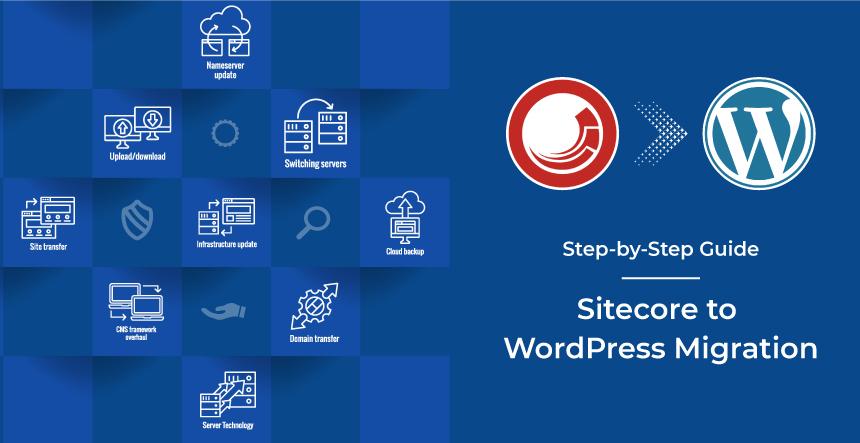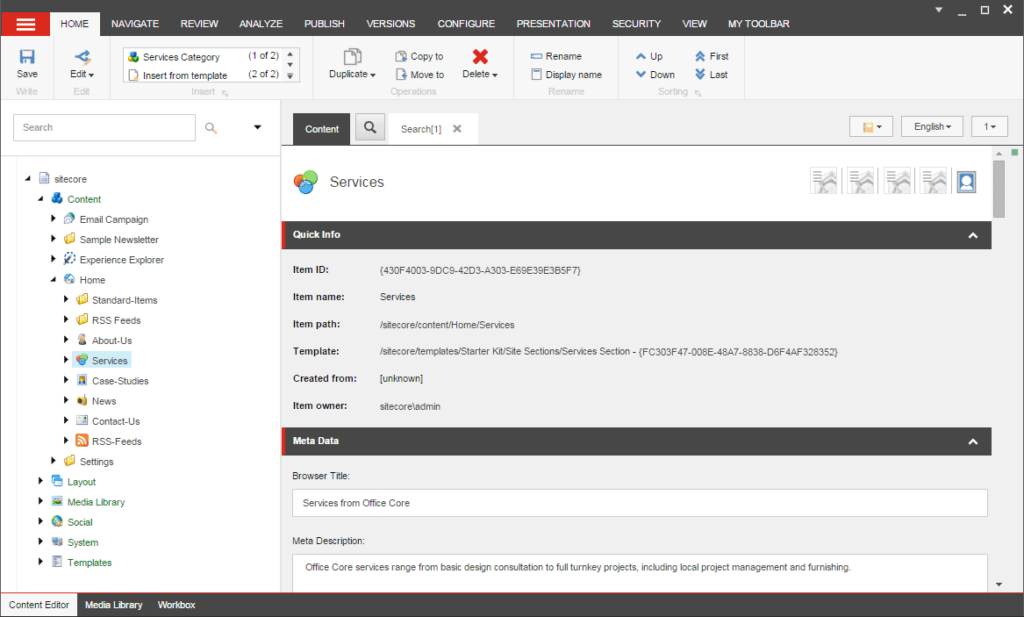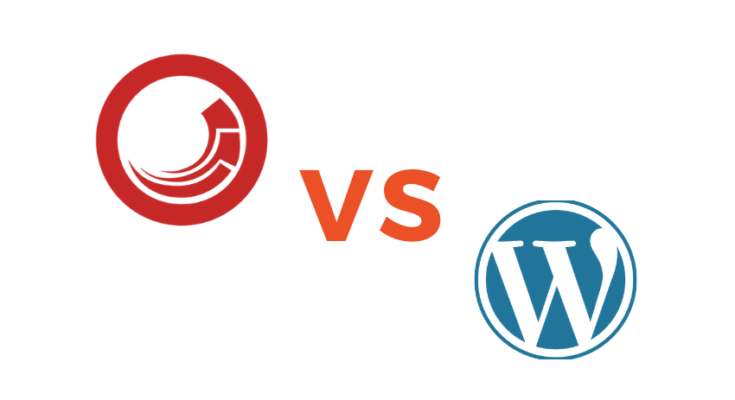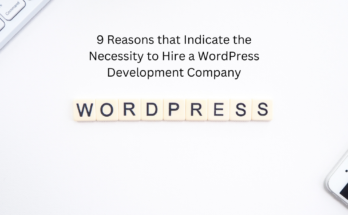Excerpt Contents: Are you looking for information on Sitecore vs. WordPress? Content management systems (CMS) like Sitecore and WordPress are both very famous, but they are not the same and have different features. Here’s a quick look at how Sitecore and WordPress compare.
Need help with Sitecore and WordPress for your website? This detailed comparison compares each platform’s features, functions, and advantages and downsides to help you choose.
Explore significant differences, performance, customization, scalability, and more to choose which platform meets your needs. Discover whether Sitecore vs WordPress is best for your website.
Website builders must choose the right platform. Sitecore and WordPress are popular solutions with pros and cons.
Learn the main differences between Sitecore and WordPress in this post to choose the right platform. We’ll explore performance, scalability, customization, and usability.
WordPress
Among content management system (CMS) options, WordPress ranks high in popularity, adaptability, and reliability. Bluehost, GoDaddy, and other third-party hosting providers install it.
Over the years, it has undergone radical changes, becoming the de facto standard for website creation. Using this platform, you can blog, open an online store, or run a business.
One important benefit is that website editing is simple and free. Website creators without technical skills should use WordPress.
It offers premium and free plugins and themes, giving you ultimate creative control over your website design. WordPress gives your website many choices!
Sitecore
Sitecore, launched in 2001, was the first CMS on the market. Many CMS systems and organizations maintain their legacy.
Sitecore is more popular than WordPress but has a much smaller market share. Alternatively, Sitecore is a powerful and adaptable CMS platform growing in popularity among organizations, marketers, and developers.
It helps businesses manage and provide consistent, relevant, and personalized consumer experiences across websites and mobile apps.
Want to become a Certified Sitecore Developer? Go through MindMajix’s Sitecore Training
Would You Like to Know How Both Platforms’ Security Stack Up?
Given the rising number of cyber-attacks, data breaches, and other digital issues, we should prioritize finding a secure platform.
Security by Sitecore
Due to its safe, enterprise-grade experience, Sitecore is the leading enterprise content management system (CMS).
Built-in capabilities make Sitecore secure, as we’ll discuss later. Since you won’t need third-party software or plugins to improve it, you won’t create security flaws or danger issues. The platform’s frequent security updates safeguard you even more.
Sitecore should be your first choice for a secure content management system.
WordPress Security
Many individuals mistakenly thought WordPress lacked the security for enterprise-level websites for quite some time. Nevertheless, WordPress has become the CMS of choice for numerous industry heavyweights, including the English National Health Service (NHS), British investment firm Blackstone, international consulting firm Forrester, and multinational bank Standard Chartered. Numerous pieces of evidence suggest otherwise.
The fact is that WordPress comes pre-configured as a secure and stable platform. So, who or what started this urban legend?
Well, there are situations in which vulnerabilities might manifest. A well-managed hosting environment is the first step to robust security with any technology. There is very little room for error if you have WordPress hosted by a reputable company that takes proactive protection seriously.
My second advice for anyone concerned about plugin security is to be wary of their origins and keep them current. Using plugins from reliable sources will reduce security threats. Also, test and update them often; ideally, you can use them with security-focused plugins like WordFence.
This is a lot of effort. For this reason, every company that has found success with WordPress has an agency partner that helps make sure these details are considered and addressed throughout the development process. This is true with any content management system (CMS) implementation in a corporate environment.
Scalability of Each Platform?
Content management systems must scale up or down. A CMS is an investment with a long payout period. Hence, this is a crucial factor in measuring its performance.
Adapt your site to your changing demands as your company grows. This requires a system that can easily add pages, features, and places without spending too much on development.
How scalable is Sitecore?
Due to its enterprise-level design, Sitecore scales well. Sitecore boosts your business’s internet presence. It lets you create multilingual sites for diverse users.
WordPress Scales Well?
Scalable WordPress is another option. WordPress can generate high-end websites, contrary to popular belief. Like Sitecore, WordPress can easily expand to meet your business’s evolving needs because of its scalability and agility.
Read: Advancеd Rеporting and Analytics in Dynamics 365 CRM: Harnеssing Data for Insights
What are the capabilities of these CMSs?
Creating and maintaining a website or application is the primary function of a content management system (CMS). Although most content management systems (CMSs) have similar basic operations, their special features and capabilities differ.
One important sign of a good content management system (CMS) is its simplicity. You and your coworkers must be able to quickly and easily become accustomed to using the platform once you’ve embraced it. Avoid content management systems (CMSs) that can’t deliver acceptable usability.
Use of Sitecore for Content Management
Sitecore is a powerful tool as a fully managed “digital experience platform” with more features than the typical CMS.
As soon as you start using Sitecore, you’ll have access to most of its top features. With that, you can get a top-notch site up and running in no time, all within the platform itself.
On the other hand, agile or small teams may find the hierarchical workflows provided by Sitecore to be too much to handle. Your time-to-market may be slower compared to more user-friendly platforms like WordPress because of this, which can lead to longer development cycles than normal.
WordPress: A CMS for Your Website
WordPress has over 45 per cent of the world’s websites built on it, making it the most popular content management system (CMS) possible. The fact that it is user-friendly and has effective content management is a big factor for that.
Thanks to its intuitive design, even team members without knowledge of content administration may easily come up to speed and divide tasks.
As a bonus, WordPress’s block-based architecture makes it easy to customise and administer your site, and editing material on a page-by-page basis is a breeze.
How Much Personalisation Can You Expect?
Nowadays, more than ever before, the capacity to personalise and adapt your website’s content to specific audiences is crucial, especially because most modern business transactions occur online. As a result, this is yet another essential consideration when you weigh your CMS alternatives.
Sitecore personalization
Sitecore has superior personalization features when compared to competing platforms. You can customise the user experience and boost your site’s performance with Sitecore’s extensive page structure and design controls.
Offering competitive distinction and generating greater conversion rates is especially beneficial for larger organisations with high potential site visitors.
WordPress personalization
Customization is another WordPress strength. Its adaptability lets you be creative with your design and add bespoke features and functions to engage your audience.
Here, Sitecore and WordPress are similar. The customization gap will narrow more if you engage a WordPress-experienced agency to develop your site and improve consumer experience.
Connecting Platforms
Make sure a digital platform works with your software before buying. The new CMS should integrate with all your digital tools, including CRM and marketing systems.
Integrating Sitecore with Third Parties
Sitecore has multiplatform support. It works with most top CRM apps and digital technologies.
Integrating WordPress with Third-Party Platforms
Most companies and SaaS solutions are compatible with WordPress, making it the easiest to integrate.
Installation of WordPress or another CMS needs minimum downtime.
TCO, or Total Cost of Ownership

You should check the solution’s value for money. Various elements, such as licencing costs and update-driven maintenance, can significantly affect a content management system’s total cost of ownership (TCO) (CMS).
Sitecore Upfront and Recurring Expenses
Even with a huge budget, Sitecore is still a pricey alternative. You’ll have to shell out cash yearly to keep your platform licencing active. If you wish to take advantage of all that Sitecore offers, you’ll need to spring for the priciest licence tier.
The total cost of ownership (TCO) for Sitecore is quite high when you include all the associated expenditures, such as those for development with an agency, hosting, maintenance, and support.
In addition, managing and maintaining Sitecore is essential for handling regular, large-scale platform changes. You may have to shell out more cash for extra development labour to get your site up to speed when updates arise because new software versions come with a hefty price tag.
If your needs are complex, and Sitecore’s features and capabilities are an absolute must, then the cost is well worth it. Sitecore is worth every penny if you’re looking for a reliable, enterprise-level platform.
TCO and Value of WordPress
WordPress’s total cost of ownership (TCO) is substantially lower, making it a more economical solution. Because it is completely open-source, WordPress does not cost anything to license. As a result, the only expenses associated with installation would be hosting, agency fees, and support after deployment.
You must acquire and pay for licences individually to utilise platform plugins or extensions. Since WordPress already has many useful features, companies can leave the tools or capabilities as they are.
Unlike Sitecore, WordPress updates take only a few hours and cost far less to manage and test your site.
Competitors’ Licence Policies: Sitecore vs. WordPress
Sitecore and WordPress have completely distinct licences.
Sitecore is a proprietary content management system (CMS), meaning that the business that developed it owns the codebase, and users must pay to use it. Sitecore licences can be pricey, particularly for bigger companies with intricate website requirements. Installing and customising Sitecore typically necessitates the assistance of expert developers or consultants, which can drive up the overall cost.
However, WordPress is an open-source CMS that anybody may use without paying a dime. Using WordPress itself does not incur any licensing expenses. If your website or business demands them, hosting services and premium plugins/themes may be necessary.
While there are other factors to consider when comparing content management systems (CMS) like Sitecore and WordPress, such as functionality and scalability, pricing is a major one when planning a budget for a web development project.
Technical Limits
Sitecore
When it comes to development in Sitecore, the sky’s the limit. Sitecore is an excellent choice for businesses seeking a content management system (CMS) without limitations and technological hurdles. For example, since Sitecore can operate independently, it may be set up to adjust its capacity automatically in response to spikes and dips in website traffic.
WordPress
WordPress’s technical limitations present numerous difficulties. Higher-order programming challenges are hard to uncover, and the system has no architectural patterns. Sites with a complicated plugin architecture are less efficient and could struggle to scale. The majority of data structures are content-related and refer to posts. Using cutting-edge tools is a challenge when working with a WordPress website. WordPress is a great choice for businesses that do not require complex customization or integration with advanced technologies.
Ecosystem and Community
Sitecore
Sitecore might have a small WordPress community, but it does have a strong following among developers and marketers. To encourage community involvement and the exchange of information, Sitecore plans user groups, conferences, and other activities. Installation, customization, and support service providers are recognised partners inside the Sitecore ecosystem.
WordPress
The WordPress community is huge and active. Many websites rely on it, which has led to a vibrant community of plugins, developers, and themes for it. The WordPress platform constantly evolves and improves because of the huge community supporting it. Users have a lot of options and support.
Benefits and drawbacks of Sitecore
Pros:
Customization –
You can enhance UX and boost conversion rates with Sitecore’s personalization feature. Advertisers can provide customers with tailored material depending on their past actions, such as the websites they’ve visited and the emails they’ve opened. A new component of Sitecore 9, Sitecore Cortex, offers marketing automation and machine learning features that will aid in the development of frictionless consumer journeys even further.
They used personalization tactics to promote the adoption of smart metres while keeping Smart Energy GB’s site customer-centric when they created their website.
Manage your content –
The content editors in both Sitecore and WordPress are user-friendly and come equipped with all the usual tools for scheduling, editing, and other features in contemporary content management systems. Sitecore goes above and beyond by allowing you to publish content across numerous sites with a single authorization. This feature makes it even more user-friendly and saves you time and money.
Extensibility –
Sitecore allows organizations to expand by supporting different geographies and developing audience quantities.
Evaluation –
Marketers need to test content and learn from test outcomes. Due to its built-in testing capabilities, Sitecore does not require further funding, unlike WordPress. A/B or multi-variate testing can be free of any extra help from marketers.
Cons:
Rollout –
The flexibility of Sitecore makes it ideal for custom website development, but at the expense of construction time. Sitecore websites are tailor-made to meet the specific needs of each company. Websites that are strong, flexible, and provide many features and security require more than a month to build, which is understandable.
The asking price –
Because every Sitecore construct is unique and tailored to each company’s needs and specifications, the price of a Sitecore website is significantly greater than that of standard CMS suppliers.
The Benefits and Drawbacks of WordPress

Pros:
Setting up –
Both the setup and use of the product are lightning-fast. Its background as a blogging platform makes it user-friendly for those who need to be better versed in website administration. You can whip up a polished website in under an hour with the pre-made templates.
Price –
Because it doesn’t need a licence, WordPress is “basically” free. Despite WordPress’s inherent lack of cost, the additional plugins and development time required to achieve Sitecore-level functionality can drive up the total cost of ownership.
SEO –
Google has a lot of faith in it since it is one of the most widely used platforms globally. You can choose from various plugins to improve your site’s SEO further.
Cons:
Creativity –
The fact that WordPress is so user-friendly is both a strength and a weakness of the platform. Because of the limited theme options, businesses that want to stand out may need a team of talented developers to make it happen. Plugins, time, and money are necessary to make changes or add original material.
Safety –
Due to its lack of native CMS functionality, WordPress requires numerous add-ons to address its shortcomings. Because of the lack of oversight, they are particularly susceptible to hacking.
Quickness –
Not the quickest. Your site’s performance may improve using a theme with little extra code. Sites built with WordPress tend to load very slowly.
Revisions –
If you care about the stability of your site, you should always use the most recent version of WordPress. In certain cases, you may need to revert to an older version of WordPress due to incompatibilities between your plugins or site structure and the most recent upgrade. This can slow things down and compromise security.
Important Considerations for Platform Selection
There are many things to think about while deciding on a website platform. It would help if you considered your website’s purpose initially. WordPress could be ideal if you only need a basic website for a portfolio or blog. Sitecore is the way to go if you require a sophisticated site with advanced content management features and the ability to create unique user experiences.
Scalability is another critical consideration. In the future, will your website have to manage massive volumes of data or traffic? Regarding enterprise-level sites, Sitecore is famed for its simplicity of use, but WordPress might need help keeping up.
Last but not least, consider the available funds and resources. Compared to WordPress, Sitecore is usually more expensive and demands more technical knowledge to install and manage. WordPress could be a good fit if you’re on a tighter budget or need more technical knowledge.
When choosing between Sitecore and WordPress, it’s important to consider your website’s requirements and objectives.
Conclusion
Sitecore and WordPress are well-known and powerful content management systems (CMS) solutions. WordPress is great for individuals and tiny organizations since it is easy to use, flexible, and customized. In contrast, Sitecore is a powerful enterprise-level content management system (CMS) that offers superior personalization, scalability, and integration features. Before making a final decision, consider the importance of cost, community, security, ease of use, customization, scalability, and content management.
To discuss your needs and learn how to use the potential of Sitecore for your website, contact their professional Sitecore development business if you are interested in Sitecore development services.




